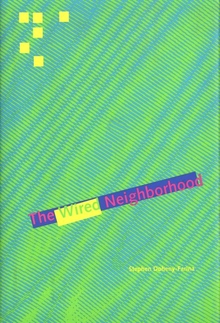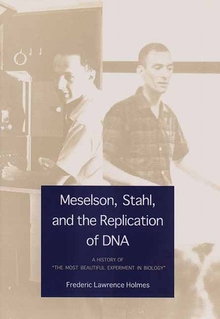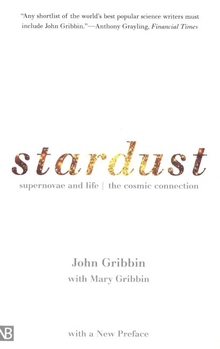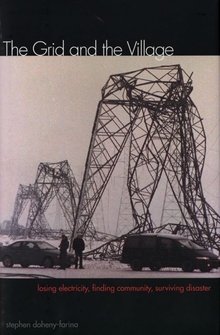The Wired Neighborhood
WARNING
You are viewing an older version of the Yalebooks website. Please visit out new website with more updated information and a better user experience: https://www.yalebooks.com
Stephen Doheny-Farina
Out of Print
Doheny-Farina offers a critical perspective on virtual reality and its social impact, showing us how people meet and converse on the net, how they teach and learn, and how they establish workplaces that can accompany them wherever they go. Along the way he reveals the advantages and hazards of making the computer the center of our public and private lives. Doheny-Farina argues that once we begin to divorce ourselves from geographic place and start investing ourselves in virtual communities, we further the dissolution of our real, dying communities. He speaks out in favor of a movement called civic networking, which promotes the proliferation of networks that originate locally to organize community information and culture and to foster pride in and responsibility to our neighborhoods.
"The Wired Neighborhood punctures most of the inflated myths about the wondrous Net. Its author also points to one small corner of this datasphere that might build, not erode, community. If you absolutely must remain plugged-in, take his advice about where to aim your mouse."—Bill McKibben
"A good book, the best of the 'cautionary' Internet-related literature I've read so far. . . . I'd recommend The Wired Neighborhood to anyone exploring information technology's impact on communities, though readers should bring plenty of questions to the table as they contemplate and discuss the book with members of their own community, be it wired or physical."—Technology and Society
"A compelling book, intelligent yet accessible, critical yet encouraging, engaging yet eloquent."—Gregory Clark, Brigham Young University
"An enjoyable, well-written, balanced approach to the cyber-utopianism and Internet hype of the late 20th century."—Laura Gurak, University of Minnesota
"A strongly felt and eloquent call for action, presented in the hope that myriad tiny pressures by individuals might direct a portion of the vast energy of the Net in locally beneficial ways. It is a reminder that community requires 'a collectivity of individuals committed to inhabiting a place and enduring with each other to improve the condition of everyone in that place.'"—Jane Andrew, American Reporter
"Recommended for undergraduate and graduate students and for anyone interested in a balanced look at the communications technologies."—Choice
"[Doheny-Farina] tells us that the wonders of the electronic universe, often touted as a way of uniting us, can, instead, divide us."—William Miller, College & Research Libraries
"The book serves interested parties better than other sources. Nowhere online can you find all of these issues summarized or explicated. . . . I am confident that The Wired Neighborhood will remain an important early analysis of the effects of the Net on our towns and our lives."—Steve Cisler, Community Networking Currents
"[This book] offer[s] an excellent introduction to community computer networks. More importantly, [it] place[s] this important development in the context of the struggle to rebuild the nation's communities."—John G. McNutt, Computers in Human Services
"An absorbing work on an important topic."—Library Journal
"The wired Neighborhood is invaluable to a nuanced understanding of the technologies now transmogrifying the meaning of community and even reality."—Mixed Media
"Doheny-Farina, a shrewd observer of encroaching mediation, makes a number of important points."—Sven Birkerts, Preservation
"An eloquent and eminently readable tale. The book will be most appealing to readers who are already seduced by the Net but are beginning to be alarmed by its power to isolate as it seduces. . . . This is a thoughtful, strongly felt, and eloquent call for action, presented in the hope that myriad tiny pressures by individuals might direct a portion of the vast energy of the Net in locally beneficial ways."—Jane M. Andrew, Technical Communication
"If Doheny-Farina isn't the first to write about the Internet with an eye critical to its assumptions and implications, he might well be the most level-headed."—Paul Maliszewski, The Business Journal
"The dilemma Doheny-Farina addresses is a real one that is unlikely to go away, and his book is a useful contribution to the debate. . . . [He] writes with an inviting fluency rare in academic Net discourse."—Charles Shaar Murray, The Daily Telegraph
"A brave little volume that dares to discuss both sides, fiddling with thought and reason, in an honest quest for insight."—Burke Campbell, Toronto Globe & Mail
"Lucid and precise…invaluable to a nuanced understanding of the technologies now transmogrifying the meaning of community and even reality."—Utne Reader
"Doheny-Farina has put together a long-overdue critique of the inflated claims that have too often been advanced by techno-utopians. . . . He skillfully uses personal narrative and lucid summaries of others' arguments to produce a text that should be easy for casual readers to follow."—Clay Spinuzzi, Technical Communication Quarter
Publication Date: September 25, 1996









